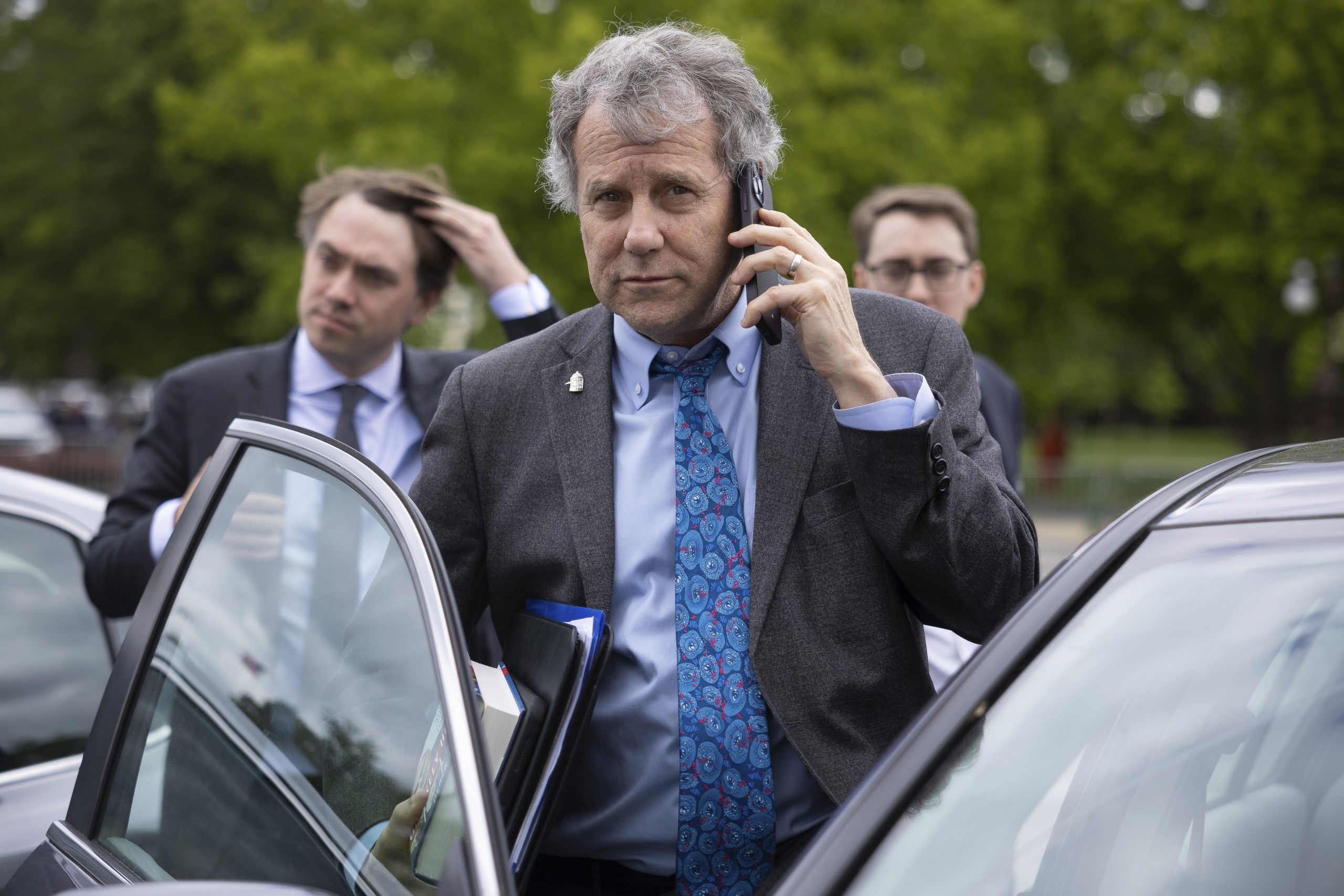
[ad_1]
Brown’s pursuit of bipartisan agreements during his reelection campaign could end with a Republican filibuster of some of his priorities. But if even a couple of his projects advance with buy-in from Republicans who want to beat him, it would give Brown the sort of accomplishment that every incumbent dreams of. And his party needs him to hang on in Ohio to keep the Senate majority next year.
“I am working on lots of things. I’m not going to judge what [Republicans are] doing,” Brown said in an interview. He declined to predict whether his GOP colleagues would stop his legislative efforts in their tracks, but alluded to some concerns: “I think Mitch McConnell‘s not my cheerleader. I’ll leave it at that.”
He’s not the only red-state Democrat in search of bipartisan wins while running a 2024 race that will determine Senate control. Two colleagues in a similar situation have encountered a GOP buzzsaw recently: Republicans filibustered Sen. Joe Manchin‘s (D-W.Va.) sweeping energy permitting reform bill last year and stopped Sen. Jon Tester’s (D-Mont.) marijuana research bill for veterans earlier this year. Manchin did manage to get the Mountain Valley Pipeline approved.
It’s unclear whether Brown’s unique GOP roster of partners will help him break through or whether his bills will bog down in partisanship.
“People are much more sensitive to giving policy wins [to people] they disagree with. And obviously, because Sherrod is a Democrat and my colleagues are Republicans … that motivates things much more than an election,” Sen. J.D. Vance (R-Ohio) said, dismissing the suggestion that the Senate race — and not garden-variety partisanship — was affecting Brown’s work.
“Ask me six months before the election,” Vance added. “Maybe it will be a different answer.”
The Senate filibuster gives Republicans ultimate veto power over which, if any, priorities of endangered Democrats can pass the chamber. Brown already got some good news this month, as his effort with Sen. Tim Scott (R-S.C.) on fentanyl trafficking made it into the Senate’s annual defense policy bill.
But it’s not hard to find examples of tough reelections derailing bipartisan legislation: Sen. Jeanne Shaheen (D-N.H.) watched the GOP block her energy efficiency bill in 2014, while the party labored to defeat her.
“Sen. Brown has always been very active legislatively. He’s just continuing to do what he always does,” said Sen. Gary Peters (D-Mich.), who runs Democrats’ campaign arm — and touted his own deal-making reputation to win reelection in 2020. “And the great thing about Senator Brown is, he has a strong track record already, even prior to these bills.”
Vance himself is a key ally for Brown — at least within the Senate. They’re working closely together on the rail safety bill, which Senate GOP leadership is so far stiff-arming over its new mandates. That doesn’t mean they’re linking arms on 2024, though: Vance endorsed Bernie Moreno as his preferred Republican to defeat Brown.
Vance acknowledged that Brown probably wishes he hadn’t endorsed a GOP challenger in the race but added that “we’re still trying to work together in the interim.” Brown said things are still “good” with Vance.
Beyond his Ohio colleague, Brown has two other influential potential GOP partners in NRSC chief Daines and presidential contender Scott, the ranking member of the Banking Committee.
Still, Brown had sharp words for Daines, alleging that he has not rounded up enough Republican votes to counteract Democrats who are balking at a provision in the cannabis banking bill, known as SAFE Banking.
Daines responded in kind to Brown’s charge: “That is 100 percent false. The problem is not in Republican votes … We had an agreement, but then they walked it back.”
Neither blamed the elephant in the room — Daines’ pursuit of Brown’s defeat next year — for the impasse.
Unlike in West Virginia and Montana, Daines has not specifically recruited a candidate to take on Brown. The NRSC is currently staying hands-off in a three-way primary among Secretary of State Frank LaRose, state Sen. Matt Dolan and businessperson Moreno.
Either way, it’s inarguable that the Brown-Daines charges indicate the cannabis bill is in real peril. And Brown predicted that Scott would not end up supporting the legislation amid the uncertainty over its status.
Yet after the retirement of Sen. Pat Toomey (R-Pa.), the two top members of the Banking panel have created an effective odd-couple bond. One of the last red-state Democrats (Brown) and a conservative senator seeking the presidency (Scott) have teamed up to advance a bill hitting back at fentanyl traffickers. Their work now has a good chance of becoming law as part of the must-pass defense bill.
The duo also forged a surprising and popular compromise on a bill that lets regulators claw back compensation from leaders of failed financial institutions.
Scott did not comment for this story. But it’s clear that, at least for the moment, he and Brown are finding a way forward. It doesn’t hurt that both men are politically incentivized to take on bad-acting Wall Street executives and drug traffickers during their 2024 campaigns.
“Scott’s running for president. Toomey wasn’t,” Brown said. “Scott is probably more practical than Toomey; Scott is a pretty conservative guy, too. But we have found things we can do together.”
[ad_2]
Source link
